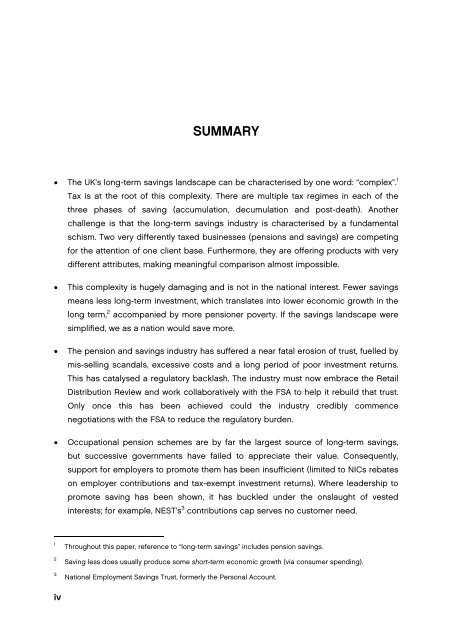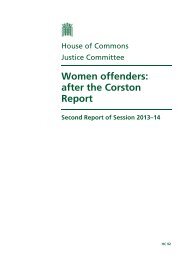Simplification is the key - Centre for Policy Studies
Simplification is the key - Centre for Policy Studies
Simplification is the key - Centre for Policy Studies
You also want an ePaper? Increase the reach of your titles
YUMPU automatically turns print PDFs into web optimized ePapers that Google loves.
SUMMARY<br />
The UK’s long-term savings landscape can be character<strong>is</strong>ed by one word: “complex”. 1<br />
Tax <strong>is</strong> at <strong>the</strong> root of th<strong>is</strong> complexity. There are multiple tax regimes in each of <strong>the</strong><br />
three phases of saving (accumulation, decumulation and post-death). Ano<strong>the</strong>r<br />
challenge <strong>is</strong> that <strong>the</strong> long-term savings industry <strong>is</strong> character<strong>is</strong>ed by a fundamental<br />
sch<strong>is</strong>m. Two very differently taxed businesses (pensions and savings) are competing<br />
<strong>for</strong> <strong>the</strong> attention of one client base. Fur<strong>the</strong>rmore, <strong>the</strong>y are offering products with very<br />
different attributes, making meaningful compar<strong>is</strong>on almost impossible.<br />
<br />
<br />
<br />
Th<strong>is</strong> complexity <strong>is</strong> hugely damaging and <strong>is</strong> not in <strong>the</strong> national interest. Fewer savings<br />
means less long-term investment, which translates into lower economic growth in <strong>the</strong><br />
long term, 2 accompanied by more pensioner poverty. If <strong>the</strong> savings landscape were<br />
simplified, we as a nation would save more.<br />
The pension and savings industry has suffered a near fatal erosion of trust, fuelled by<br />
m<strong>is</strong>-selling scandals, excessive costs and a long period of poor investment returns.<br />
Th<strong>is</strong> has catalysed a regulatory backlash. The industry must now embrace <strong>the</strong> Retail<br />
D<strong>is</strong>tribution Review and work collaboratively with <strong>the</strong> FSA to help it rebuild that trust.<br />
Only once th<strong>is</strong> has been achieved could <strong>the</strong> industry credibly commence<br />
negotiations with <strong>the</strong> FSA to reduce <strong>the</strong> regulatory burden.<br />
Occupational pension schemes are by far <strong>the</strong> largest source of long-term savings,<br />
but successive governments have failed to appreciate <strong>the</strong>ir value. Consequently,<br />
support <strong>for</strong> employers to promote <strong>the</strong>m has been insufficient (limited to NICs rebates<br />
on employer contributions and tax-exempt investment returns). Where leadership to<br />
promote saving has been shown, it has buckled under <strong>the</strong> onslaught of vested<br />
interests; <strong>for</strong> example, NEST’s 3 contributions cap serves no customer need.<br />
1<br />
2<br />
3<br />
Throughout th<strong>is</strong> paper, reference to “long-term savings” includes pension savings.<br />
Saving less does usually produce some short-term economic growth (via consumer spending).<br />
National Employment Savings Trust, <strong>for</strong>merly <strong>the</strong> Personal Account.<br />
iv

















